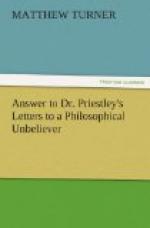nature of the subject upon which this prejudice takes
place, is such, that the finest genius is nearly equally
liable to an undue bias with the most vulgar.
To question with boldness and indifference, whether
an individual, all-forming, all-seeing and all-governing
Being exists, to whom, if he exists, we may possibly
be responsible for our actions, whose intelligence
and power must be infinitely superior to our own,
requires a great conquest of former habitude, a firmness
of nerves, as well as of understanding; it will therefore
be no great wonder, if such men as Locke and Newton
can be named among the believers in a Deity.
They were christians as well as theists, so that their
authority goes as far in one respect as in the other.
But if the opinions of men of great genius are to have
weight, what is to be said of modern men of genius?
You, Sir, are of opinion that the world is getting
wiser as well as better. There is all the reason
in the world it should get wiser at least, since wisdom
is only a collection of experience, and there must
be more experience as the world is older. Modern
Philosophers are nearly all atheists. I take the
term atheist here in the popular sense. Hume,
Helvetius, Diderot, D’Alembert. Can they
not weigh against Locke and Newton, and even more
than Locke and Newton, since their store of knowledge
and learning was at hand to be added to their own,
and among them are those who singly possessed equal
science in mathematics as in metaphysics? It is
not impossible, perhaps not improbable, from his course
of learning and inquiries, that if Dr. Priestley had
not from his first initiation into science been dedicated
for what is called the immediate service of God, he
himself might have been one of the greatest disprovers
of his pretended divinity.
In England you think, Sir, that atheism is not prevalent
among men of free reasoning, though you acknowledge
it to be much so in other countries. It is not
the first time it has been observed that the greater
the superstition of the common people the less is that
of men of letters. In the heart of the Papal
territories perhaps is the greatest number of atheists,
and in the reformed countries the greatest number
of deists. Yet it is a common observation, especially
by divines, that deism leads to atheism, and I believe
the observation is well founded. I hardly need
explain here, that by deism in this sense is meant
a belief in the existence of a Deity from natural and
philosophical principles, and a disbelief in all immediate
revelation by the Deity of his own existence.
Such is the force of habit, that it is by degrees
only, that even men of sense and firmness shake off
one prejudice after another. They begin by getting
rid of the absurdities of all popular religions.
This leaves them simple deists, but the force of reasoning
next carries them a step farther, and whoever trusts
to this reasoning, devoid of all fear and prejudice,
is very likely to end at last in being an atheist.




